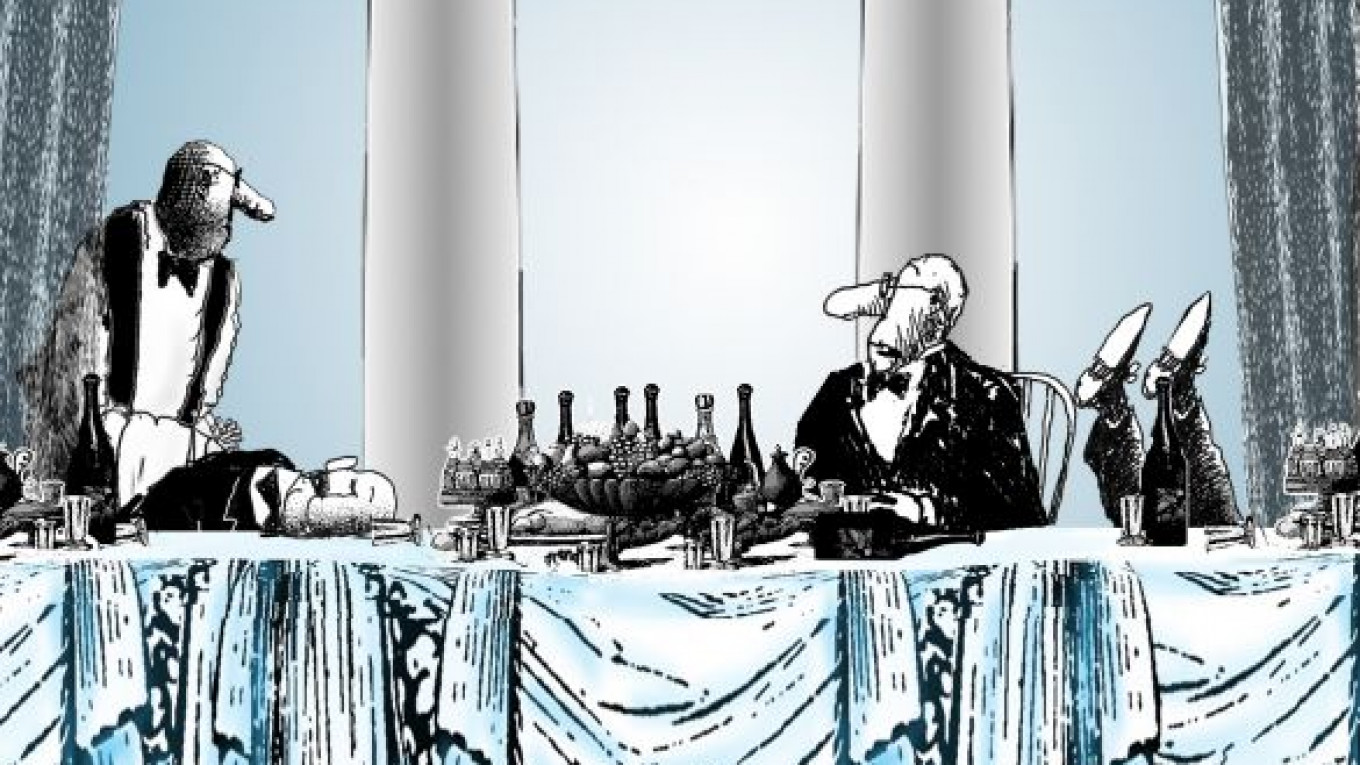The latest WikiLeaks revelations are causing blushes and choking fits around the world, and one Dagestani oil magnate will definitely not be inviting those friendly American diplomats back for another party.
Forced to dish out hearty handshakes and fixed grins in public, diplomats understandably enjoy composing acidic bon mots when they’re writing home. And the diplomats in Russia and other CIS countries honed some good stories for their memoirs while rubbing shoulders with the local elite, or whatever passed for one.
Some of the complaints are petty. In Kazakhstan, a U.S. ambassador sneered that one businessman insisted on ordering wine for dinner — and then washed his meal down with three cans of Coca-Cola. Even worse, he forced the ambassador to order his lamb chop well-done instead of rare, telling him “this isn’t London.”
A Kazakh metals and mining magnate spent his billions on anything but good food, another diplomat quipped in an entertaining report called “Lifestyles of the Kazakhstani Leadership.” Every time he went round to his house, the menu was the same, he complained: boiled meat, noodles and pilaf. And the charmless waiters seemed to have gone to a “Soviet cafeteria training academy,” he added.
Then there was the defense minister, who enjoyed “drinking himself into a stupor,” the diplomat wrote, saying the minister received a senior U.S. diplomat while slumped in his chair and slurring his words, and explained that he had been toasting cadets at a graduation ceremony.
In Kyrgyzstan, the ambassador reserved her choicest remarks for Britain’s trade envoy Prince Andrew, who brought his unique insight to a meeting with expat businessmen. Told that corruption was rife and every deal had to be agreed with the president’s son, the prince “laughed uproariously, saying that ‘All of this sounds exactly like France,’” she wrote.
One woman who may not raise an eyebrow but may manage an expression of frozen horror is Mehriban Aliyeva, the wife of Azerbaijani president Ilham Aliyev. She was cruelly described in a cable quoted in Der Spiegel as so transformed by cosmetic surgery that she could pass for one of her daughters — but could barely move her face.
The best story comes from a Moscow diplomat who gives a lovingly detailed account of attending the wedding of the 19-year-old son of Dagestani oil chief Gadzhi Makhachev.
Makhachev, who is also Dagestan’s representative to President Dmitry Medvedev, seems to be quite a character. He is pictured in a loud pinstriped suit on his official web site, which describes him as a “phenomenon.”
The diplomat wrote that Makhachev once gave him a ride in his Rolls-Royce Silver Phantom in Moscow, but the leg-room was a bit lacking because he’d packed a Kalashnikov.
Makhachev later denied to the Kavkazsky Uzel web site that he had ever had a Rolls, though the Kalashnikov was not mentioned.
The wedding party was a drunken affair lasting eight hours, with a break for a spot of jetskiing, the diplomat writes. Makhachev had a special vodka bottle filled with water to enable him to drink a toast with every guest, and presumably the diplomat also kept a clear head.
The diplomat has a great turn of phrase, describing “dramatically paunchy men” dancing the lezginka and a “cock-eyed” Chechen leader Ramzan Kadyrov joining the fun.
Kadyrov dances “clumsily” with a gold-plated automatic stuck in the back of his jeans, the diplomat says, and quotes Makhachev as saying that he gave the newlyweds a five kilogram lump of gold as a gift.
Makhachev denied to Kavkazsky Uzel that Kadyrov attended the celebrations, which he described as “nothing special, just an ordinary Dagestani wedding.”
A Message from The Moscow Times:
Dear readers,
We are facing unprecedented challenges. Russia's Prosecutor General's Office has designated The Moscow Times as an "undesirable" organization, criminalizing our work and putting our staff at risk of prosecution. This follows our earlier unjust labeling as a "foreign agent."
These actions are direct attempts to silence independent journalism in Russia. The authorities claim our work "discredits the decisions of the Russian leadership." We see things differently: we strive to provide accurate, unbiased reporting on Russia.
We, the journalists of The Moscow Times, refuse to be silenced. But to continue our work, we need your help.
Your support, no matter how small, makes a world of difference. If you can, please support us monthly starting from just $2. It's quick to set up, and every contribution makes a significant impact.
By supporting The Moscow Times, you're defending open, independent journalism in the face of repression. Thank you for standing with us.
Remind me later.






